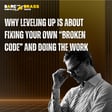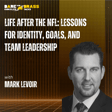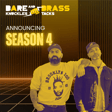Become a Creator today!Start creating today - Share your story with the world!
Start for free
00:00:00
00:00:01

Breaking into Cyber, Finding Your Why, and Making the Entrepreneurial Leap
Kenneth Ellington returns, one year later to talk about the changes from leaving his corporate gig to work for himself.
George K and George A talk to Kenneth about:
- How he's balancing running a cybersecurity academy, staffing agency, AND active security work
- Real talk about the challenges of building business processes from scratch
- Brutally honest advice about job hunting in cyber
- Why job opportunities still exist in cyber - but you need the right mindset
- Contract work vs full-time positions
Favorite quote: "Be honest with yourself. Lying to yourself never is a good option."
Whether you're looking to break into cyber, considering the leap to entrepreneurship, or just want some straight talk about the industry - this episode delivers valuable insights from someone walking the walk.
Shout out this episode: Henry Davis, Techtual
Transcript
Podcast Introduction
00:00:06
Speaker
Yo, this is Bare Knuckles and Brass Tax, the cybersecurity podcast concerned with humanity in the industry. We're talking trust, respect, and everything in
Guest Introductions
00:00:15
Speaker
between. I'm George Kay on the vendor side.
00:00:20
Speaker
And today, Kenneth Ellington returns almost exactly one year after his last appearance. We reached out to Kenneth because he's taken a big job change. He left his big consulting gig and kind of took his side project full time and is also doing other things. So we wanted to talk to him about that entrepreneurial
Career Transition and Planning in Cybersecurity
00:00:39
Speaker
drive. But also what he's doing is ah staffing and contracting and wanted to talk about that side of the job market.
00:00:47
Speaker
Yeah, and he is absolutely on point. This guy is at the, we'll call it the beating pulse of job acquisition, of hiring, of actually doing skills development while actually serving clients. We got into really good advice on how to do career planning, how to actually get yourself started, the steps you need to take, the considerations you need to have, and how to actually you know try to plan out a successful experience in your cyber career. so I think for folks who are going through that career transitional phase or they're new in cyber and they want to figure out how do I map out my way in this thing, this is the episode to listen to. Kenneth Ellington, welcome back to Bare Knuckles and Brass Tax. Thank you. I'm glad to be here.
00:01:34
Speaker
Yeah, so we are recording and this is going to air almost exactly a year after the first time you were on the show. But when I reached out, a lot had changed. So it's been a year. Tell us what's going on, what has changed, and then we'll get into it.
00:01:51
Speaker
Sure. So I left my corporate job at Ernst Young as a senior consultant back in September. um So I worked working for myself full time for the past four to five months. um It's been really awesome. We've stood up another business line. um So we are doing consulting and staffing for government um entities, settle federal, state and local for United States. We're also doing consulting for meeting businesses as well.
00:02:16
Speaker
Wow, that is a big change. Can you talk a little bit about what was the inspiration? Like, what was that? What was that moment where you're like, I'm going to go out on my own and do this. So I've been planning for this for the past, like, I would say 12 months.
Balancing Multiple Roles and Business Growth
00:02:31
Speaker
There's a situation at work which I wasn't comfortable with or how I kind of get treated. So that kind of prompted me to kind of plan my exit strategy for the past, like, 12 months. I'm kind of building the back-end processes to make that happen, being given talking to a client. So I might want to work for me.
00:02:45
Speaker
And then an opportunity came along, um, to get a senior throw hunting in contract for one of my new clients. It pays almost exactly the same for what I did a UI by work half the money hours. Um, that's a good deal. Um, I took that jump basically. And then I had the flexibility to kind of work at other conflicts as well. So I've been doing that. So it's been a really, really fun. It's been a lot of work because we're trying to set up for 15 positions for a client right now. So I'm doing probably 16 interviews for a week.
00:03:15
Speaker
um to find the right candidates, which is a lot again, um but it's fun. Yeah, so wait, let's let's get it all out. There's a lot. So you're still running the Academy, right, where you're teaching. and That's where we first encountered you. And so now you're also running staffing for security positions. Yes. And you're also actively doing security work. Yes. Good God, man. But I mean, I say that as somebody who also has too many irons and too many fires. So congrats. Thank you.
00:03:50
Speaker
Yeah, I think it's it's pretty amazing. ah especially um I like the diversity and range of kind of what you're doing because I think as a career model, ah it really shows a lot of folks what you can do transitioning into this and trying to figure it out, especially from a ah technical practitioner standpoint.
00:04:07
Speaker
so Where do you find i guess like where do you finding the energy to be able to handle your work managing a community in an academy while still trying to build essentially your consulting practice? Because now you're in a private company. You're probably building up your your book of business, your client set. It must be a little bit hard sometimes because you know that's a lot of conversations with a lot of people. And I don't know about you, George, but I know even I have a limit as to how many meetings I can take in a day.
00:04:38
Speaker
Yeah, it's exhausting. So from my from my perspective, right, biggest thing is having the right team around me, because I can do this all by myself. I lose my damn mind if I did. So I'm a really strong business community and business group, especially for my partners and advisors.
00:04:54
Speaker
So Markeisha is one of my business partners for my staff inside. She works in the GRC space, so she's been helping me out a lot to kind of do initial sourcing. Then I brought in one of my good friends, Emmy, to all of a sudden, who runs her own recruiting company for technology. So Emmy does it full time. This is his entire job, right? Just recruiting. She's really good at it, too.
Business Challenges and Strategies
00:05:14
Speaker
So I was willing to kind of take a little bit more profit margins to start off and make sure we actually staff these positions, right? So just able to kind of help build our systems up and help us understand like what we're doing. Because we were doing it and there's a lot of questions. I'm like, oh, I didn't think about that. Because I'm like an engineer at heart, right? Like relocation bonuses, right? Can they actually work remote, right? Is it fully on site, right? And things that nature, which I didn't really like.
00:05:39
Speaker
think about, right? um But she kind of drove me and he's like, hey, can I like ah please ask you questions, right? And I'm like, I don't know, right? So it's just stuff like that she's been really helpful with. It's pretty amazing because and in my life right now, I maybe understand a little bit about that startup pain of like, hey, so we got to build processes and we got to get them into the ah CRM. and ah we have to kind of figure out what's going on with this engagement. And oh, this client wants to do business with us. Well, how do we actually build a mandate within the CRM? What's the s SOW look like? How do we translate? Like the minutia of running a business. And then if you're if you're one of the the founding partners or principals or the one of the C suites, then there's the whole cool. So let's figure out financial management and taxing because, you know, we don't have a CFO right now, but we still got to file stuff. Have you found that like
00:06:30
Speaker
the the trial by fire or drinking from the fire hose of learning how to run a proper enterprise from a business perspective. Have you found any kind of enjoyment out of that or is it just the most painful part of your day?
00:06:45
Speaker
Full disclosure, I hate taxes. I hate, not even paying them, I'm just doing them. I hate this mindset of my entire being. um I get i get ah like anxiety outside of Excel, right? It might not be counting too much, I hate doing it. So I have a bookkeeping system and bookkeeping team that manages a lot of our finance day-to-day. So I don't really go in for like an overview and kind of organize things that need to be. If I ever get confused, I can call them for a beer charge and maintain as I want to.
00:07:12
Speaker
So that's that made it a lot easier from like the overall business perspective, right? um Again, going going back towards my advisor. So one of my advisors, like a multimillionaire, she's run various companies in all sizes. um So she's really good at basically helping me out and like developing plans and strategies. So I'm like, she's running around with my head cut off doing random stuff. Oh, she's googling. How do I do this? Bro, that's how I did my entire cyber career, but go on. Yes. Hey, not calling you out. um So it strikes me also, Kenneth, that because you are you're sort of at both ends, you're trying to train people who are upskilling or new and then placing. I wonder if you could talk a bit about how those two things, do they feed each other? Are they completely sort of compartmentalized? Has it changed? like
00:08:02
Speaker
what you're teaching, because now you hear what people want out of candidates. Anyway, just how about that? Because that's kind of a cool closed loop ecosystem you got to go in there. Yeah, that was about the plan from the start. um So it's been interesting, right? um I've always asked my hiring managers from my coaching side, I have a lot of friends that run different companies or they're pretty high up, right? So I asked them, okay, what do you want to chance exactly? And I put this in the program, right?
00:08:27
Speaker
So I've been asking for a more security specific data sets, right? Networking in AWS is your stuff. So I've been building out 300 labs for that as well that we've been putting inside of our environment and the students love it so far. A lot of good feedback from that. um And so my my goal is sorry to put my best and brightest students that do well in the program, graduate, put them on a contract either directly through us or through our clients, right?
00:08:50
Speaker
So you can go from being trained up, you can get promoted and then put directly inside of them, a client environment, right? So kind of full end lifecycle, basically. um Hard part I found is, I would say probably 70, 80% of people that apply towards our jobs get auto auto auto disqualified because yeah um they don't read
Effective Job Application Strategies
00:09:11
Speaker
the job description. So if George is like, um I'm like, okay, George, um apply for this role for cybersecurity engineer.
00:09:19
Speaker
I'm like, I'll put your name down. He's like, yes, no. I'm like, that doesn't help me out. I'm like, what is your name? He's like, yes, last name, no, right? Because he just clicked the checkbox. He's not actually read the instructions. He's like, all this qualifying, right? Or it says, collateral is our government contract, and so a lot of them are clearances, right? And George is like, let's say he's in, I don't know, Portugal. He's like, can I work this for a moment? I'm like, it says TSI clearance. It needs to be on site. Oh, what do you mean it has to be on site? What? It can't be remote? I'm like, no.
00:09:49
Speaker
um They're going to read the instructions, right? So they all disqualified. Is that something that you are then like kind of wrapping into the academy and being like, all right, we just went through this ah network security exercise. But let me also tell you about applying for jobs. Yeah, chinese I should want to use LinkedIn because people don't want to do it. I was like, I got told to hush on one of my comments, on Mike, last week.
00:10:16
Speaker
There's a guy, he told me, he said he was looking for internship and he's found my post about him. I'm like, I haven't posted about any internships in the past like six months, but I have like three interns already. He's like, hush. I was like, what? What? Yeah. Okay. Well, that's, that's a good way to get a job is to insult the hiring manager. Sure. I guess that's a tactic. Was it a bot? Was it a real person?
00:10:43
Speaker
i I'm pretty sure it's a real person. I'll send you guys some messages after this. okay i I mean like I have to say for your for your lesson on hiring and all I have to say is that the army um When I was in the army, we had a ah ah really good saying when someone would would be very, very silly like that. And our instructors would look at us and just say, RTFQ. And you're like, what's that? Read the fucking question. and So that's like always been in the mic in my head. Like when I ever ever go through kind of complex processes, like, wait a minute, what is this actually asking to do? Like, is this the right thing? And I think
00:11:21
Speaker
You're right. We maybe in our training programs have to start considering baking in some critical thinking, even in professional courses in training.
Scaling the Business and Market Insights
00:11:31
Speaker
um But I wanted to go back to kind of business development as a practitioner and and kind of the skill set there. Where do you see this entity going from a scalability standpoint? Like when you're actually looking at how you want to take this organization and grow it,
00:11:48
Speaker
Do you see this being like a large scale enterprise that you want to turn into a thing, they have a brick and mortar office place and a big fancy logo and all that jazz? Or do you see this as always being kind of a boutique project? And I and i asked this not from like like a personal standpoint, but obviously you give us your personal opinion. and But I mean, from how do you envision the scalability of the business? And where do you see the biggest challenges in that per each direction, if you wanted to go that way?
00:12:16
Speaker
So for my personal um philosophy for how I like to run businesses, I don't ever want to be played with Microsoft, right? Because once you become that big, you kind of lose your uniqueness of it. And the the quality of people I want to bring in, I won't be able to do that, right? Because if a class size is the attendance and there are 100 people per class, right? I can't give them the same quality, right? And same interaction that I can normally give them. Right. So at a certain, at a certain extent, we're always going to be decently small and pretty agile from that perspective. I want to have really high quality, get really good results from my clients, right, and make it very personalized. um Because that's one of the things I like about college is what kind of faceless sometimes, and people don't really know, like me personally, Kenneth Ellington, like as a person student. So that's kind of how I want to keep it um from a scalability aspect of it. um Right now we're projected to do about probably
00:13:04
Speaker
half a million dollars this year, we'll probably do more. I think last year we just hit six figures, so we're projected to do probably five times that amount. And so there's some different arms that still want to kind of build up for the business, the consulting stack inside as well. So there'll be a certain point probably next couple of years where I'll probably take a step further back and do more of an executive role, because it won't make sense for me to try to do day-to-day technical stuff anymore. Some are from like a multi-million dollar company. I'll just probably pay at the senior hundred to do my stuff, right? I'll take a kind of step back and do more executive role that kind of lead the business into the next frontier.
00:13:42
Speaker
um
00:13:49
Speaker
Hey listeners, listen up, we're coming to Toronto. We'll be setting the stage on fire with the opening keynote at Secure World Toronto on April 8th and we'll be closing out the show with our signature event, the Cyber Pitch Battle Royale. Check the show notes for discount codes when you register for Secure World and a link to register for the Battle of Toronto. Let's see who takes home the belt. We hope to see you there.
00:14:23
Speaker
Yeah, I mean, that's the number one friction point in startups that I see is this is more product level startup, but it's like the founders have a hard time letting go.
00:14:34
Speaker
because they like the energy of kind of being in the mix, but eventually you have to hire the people and trust the people because you have to your role has to change and it's how well they negotiate that change that can determine a lot of success. If they still want to be on all the sales calls, then you're lot you're not the CTO, you're a sales engineer, right? So it's like you have to you have to pick your battles as you go.
00:14:57
Speaker
um I want to circle back to the the job stuff, like in terms of applying. I think there's a weird juxtaposition there where the ingestion of applications is highly automated. And I think people think that because of that, they' they can also kind of automate their application process, which is why they're not reading each individual job description, right?
00:15:26
Speaker
yeah So you can have two companies that have cloud architect or security engineer roles. but there's nuance to each of those and it sucks for the applicant that you have to take the time to kind of make it bespoke because you can't send the same thing to both because their systems might be tuned differently to look for different words or whatever. Anyway, I wouldn't see if you have any thoughts on counseling ah your academy graduates and stuff like in that regard. we like here's I know it sucks, but here's the patience that you have to apply.
00:15:59
Speaker
I normally say, especially when you're trying to get in, there's a certain amount of effort you have to put in, especially for applying to a job, so you'll have to submit certain amount of applications. But um I've heard people, they'll say they'll submit a thousand applications in three months. I'm like, really? um like How many jobs are you applying for?
00:16:19
Speaker
like are there Are there a thousand security analyst positions in your area? a I don't really think so, right? um So I would say normally the the best approach I've always taken is most of the jobs we've gotten, I've either been referred or they reach out directly towards me because my network and proposal is very strong. right So like any career field, you can be a doctor, a lawyer, a lead electrician, a lead water, it will requires time and patience. right So developing your network early on, right? Having that understanding of, hey, this is going to be hard, but it's still hard that I choose from my life and my desires, right? um Once you have that down, a lot of people do not have that down, my personal opinion, right? They choose subsidy for the money. I'm like, you can make a lot of more you make a lot more money on the other fields, right? like You have to realize that, right? Subsidiary is not the only thing in the world, right?
00:17:03
Speaker
So understanding like what your why is and why you're willing to put up with the BS and crap of cybersecurity is your goal. If you're able to get that down, then the rest is decently easy. I can give you step-by-step instructions I want to do. And if we're in human psychology, we we're basically the same creature for the past 10,000 years, so it's gonna work. yeah i get yeah i can I can give you those steps, right? But if you don't understand the why, why you're doing this, then it's hard to kind of hard to help you out. Yeah, I really love that you bring up the why. um we have ah a lot of the trail for the influencers and bootcamp economy that are like starting salary, 160 grand or whatever nonsense is out there on LinkedIn. so
00:17:45
Speaker
If you're not motivated intrinsically because you have an interest, like it's, it's a hard, it's a hard mountain to climb, like but yeah, back to you. Yeah, I know. You're right. Like one of my favorite books on business is a Simon cynics start with why that's literally the entire concept of starting an entity or a venture. Um, but I want to ask though, just in terms of, of, of orienting and coaching, um, you know, your, your students.
00:18:12
Speaker
I've been involved with a lot of conversations that talk about essentially the hiring crisis in cybersecurity.
Opportunities and Skills in Cybersecurity
00:18:20
Speaker
And it's been multiple years now. People have been talking about all these millions of unfulfilled positions, but then there seems to be a ton of people who are applying to jobs and going through the experience that you know everyone in the job market's been going through for the last, I'd say two and a half years, three years. So really, ah I wanna ask your opinion on Do you think there is actual opportunity in cybersecurity? Or is this all just a lie? because Because the reality is, I'm seeing a lot more people complain about having frustrating job application experiences, job hunting experiences, where they get the certs, they get the qualifications, they do the free hack box stuff. They try to show competence and they don't even get an opportunity. A lot of them don't even get a chance to interview.
00:19:11
Speaker
Is it a lie? Do do you see that maybe there there is no real opportunity in cyber anymore? I think it's opportunities. um I would say it's probably a more competitive than it was maybe 10 years ago. More people want to be in this field. and I think there's a disconnect between um i'll say but corporations what want and what people actually are actually expecting. And I can only give my personal experience from trying to hire people and trying to help people out. But there is, i I don't think, again, going back to the marketing of how people market cybersecurity, how easy you can get in, right? Again, it is hard, right? So my thing is, I feel like many people understand, right? Someone says they've been looking, or they've been trying to give in for the past six months, I'm like,
00:19:51
Speaker
for like any other field, it takes probably maybe two to six years to get here, right? You can be a doctor, right? You go to school for eight years and you pay half a million dollars in student loans. The guarantee is you're almost guaranteed to get a job probably afterwards, right? Because no one wants to do that amount of work, right? Because it's incredibly hard, right? That's the barrier to entry. If you want to be a top global worlder, you'll probably travel around the world and weld for like 16 hours a day, maybe underwater or like two miles up in the air, right?
00:20:18
Speaker
it's hard it's It's hard to do that, but the buried entry might be a little bit lower to do that um from the standpoint of not everyone wants to do that because it's kind of scary and dangerous, right? So whatever job you pick, again, what is your why for it?
00:20:30
Speaker
So there there is opportunity to have security. It is hard and initially from the standpoint of breaking through, be able to build your network, actually show confidence in what you're doing, which means, Hey, can you tell the story about what you're doing? Right. You just having comptier certs, you having this train isn't going to help you out. If you can't tell me about, Hey, what can you actually do? Right. Like if I gave you a prompt command line, um, ID platform, swank instance, word of case, maybe, can you actually show me what you can do? Right.
00:20:57
Speaker
So a lot of times, for my interviews, I'll just walk inside my environment and say, hey, here's what I'm gonna actually do. And normally they like that a lot, right? When people aren mar people can't do that or don't want to do that, right? That's one example that you can kind of show competence.
00:21:11
Speaker
Yeah, I think it's kind of tough too because you don't want to get looped into that free project type thing that happens in a lot of job ah processes where it's like, hey, do this eight hours of work for free for us and maybe we'll call you in for the next phase. ah But you're right. It's a it's a it's a balance. i just want to call attention to the frustrations and struggles that a lot of our listeners and a lot of people in our greater community have articulated.
Career Path Choices in Cybersecurity
00:21:35
Speaker
And you are one of the best resources that we could find to actually give them good, substantive advice as to how to actually play this game as it currently is today. So thanks for that.
00:21:46
Speaker
Of course. yeah yeah Also, but ah you mentioned um you know fulfilling contracts and stuff like that. and I think there is still some hesitance in the workforce to apply for contract jobs. Everyone wants full time, whatever, like that. Can you talk a little bit about that side of the industry? like Hey, a contract is still a foot in the door. I know plenty of people who went on contract and got turned over to full time, but you know I think it's is maybe it's a mental hurdle. You mentioned human psychology. It feels tenuous, feels less secure. I don't know. what's What are your thoughts there on on the preponderance of contracting gigs versus full time?
00:22:27
Speaker
I tell people, I've seen people get laid off on contracts or full-time positions normally, right? So you can still get fired pretty easily because it's in America, right? ah So I don't, like I'm honest with people, I've seen people get laid off on full contracts, or full-time jobs, they've never 10 years, they get laid off because the company did well, but the executives didn't want to lower the bonus amount, right? So they kind of just laid staff off. um So I would say if you're on a, so if you're normal to you work at, um Salesforce, right? And you're a full-time software engineer, for for example, right?
00:23:00
Speaker
um Your hours don't end at 40 hours per week, right? You may have other internal products you have to do, right? And you don't get paid overtime, right? So you may function to be scheduled to work 40 hours, but you may work 60 or 65 hours, right? You don't get paid for the extra time, right? You just get that salary amount and the bonus. Now, when you're under contract, your hours end at 40 hours per week. If you only work more, you're gonna pay me overtime, right?
00:23:24
Speaker
So if you don't work another project to do other things, you can do that as well, right? And so I just calculate how much they would pay me on a full-time salary compared to how much I'm making a contract, right? And the difference for that, because I'm decently talented, I can make that difference up in probably a couple months, honestly. All right, so for me, I personally don't mind.
00:23:43
Speaker
Because one, I'm not married, and one, I don't have kids, so I can move anywhere in the country if I need to. So I'm pretty flexible with myself in that regard. So for me for me personally, working a contract, working full-time jobs, does that really matter to me? I'm still gonna make my money either way.
00:23:57
Speaker
Yeah, it's kind of tough, right? Because like it's at the end of the day, you kind of have to figure out what your priorities are and what your goals are. And I think an exercise that a lot of people need to get back to doing, and and I'd love to get your take on it, is actually projecting career planning. I think it's really tough at the start of a career, but I think You have to look at not the role that you're applying to, but what do you want to do in the role afterwards to to pick the right role in the immediate term? And I don't think people think on those terms. They don't think in in three, five and ten year kind of iterations.
00:24:32
Speaker
Where do you think we should go in terms of how we coach people on their careers, especially at the start, like how they think about their careers, I think is the fundamental problem. And I want to know, like, what do you think is the best messaging to tell someone who's absolutely junior or if they're transitioning their career into our field? What's the, what's the advice for them on how to get the most success out of it? Um, probably be honest with yourself. The lines yourself never is a good option.
00:25:02
Speaker
my personal opinion. So I feel um you can probably talk about this more Georgia um from this perspective of a lot of people that are really technical, but they want' more they want more money, so they become managers, even though they're terrible managers. um And so they'll kind of just run them up in the system, even though they don't really have the skills to manage people.
00:25:22
Speaker
Right. So I tell people, it's okay not to be a manager. That's probably fine. Right. You can always be technical. That's what you desire to do. But in then and, and folks, if you do like managing people, you don't want to be too technical. You can also do that as well. Right. So it just depends. Um, but again, be very honest with yourself. Right. For me, I found out really quickly. I don't, I don't want to manage people at a super large corporation. Right.
00:25:44
Speaker
um because I have a very little tolerance for BS. If you think we do a really stupid process, I'm going to say something, which is why I got in trouble at my last company. um so that's for So for me personally, be my own boss is fine because I don't mind doing the work. i find For me, I just want to do it for myself, right? um So for me, that's why I do come in, a manager I manage a large consulting firm personally. Nice. All right. We got to close out soon. I know you got a
Top Job Seeking Tips and Farewell
00:26:11
Speaker
hard stop. so What is, a you know, two to three top tips for people looking for work right now in cyber? I would say.
00:26:23
Speaker
Don't bash a person trying to find a job from. Don't tell them to rush. That's a given, but that's awesome. Yes. I have to not to remind people that, sadly, now. Second thing is always, we wish when you shout out to somebody, always um give more than you take, right? Because it's very awkward. If I don't know you, you ask me for a job immediately right at the back. You have to read your resume, right? um Think about it like I'm going to actually end a personal relationship. You will walk up towards the street and ask them for money directly, right?
00:26:52
Speaker
At the time, that's kind of weird, right? So always get more than you take and eventually someone will want to get back towards you. Again, human psychology, that's just how we are. Third thing I tell people, if you are able to move and you're here with moving, then definitely move for a job. If it's another location you're comfortable with, right? Because for me, personally, I'm from Tampa, Florida. That's where I grew up for most of my life. And after college, I moved to Dallas, Texas for my career. It was very hard. First time I went to Texas was to look for a apartment. Second time was to move. I knew nobody there. I had no friends and no family. It was literally just me. So it was very emotionally hard on me. But because of that, I had to grow in ways I couldn't even imagine. And now I'm here. Right. So just have the open mindset, I'd probably say.
00:27:36
Speaker
really really sound i just want to know for your step one just super what would be the first thing someone should do when they want to start getting into this a very very first step one what do they read um
00:27:52
Speaker
There's a lot of good resources out there. I'll give a shout out to ah my boy, Henry Davis on Tech Tool. He has a lot of good resources out there to kind of break down fundamental science theory topics and overall career topics within this field. Kind of give people a good sense as if, well, if you're the right field for them to actually do, which is very important, right? Because I want people able to spend a year doing something that they could have figured out in a month that that isn't for them, right? So just kind of take a step back, evaluate like where you are mentally and physically and see if this is a direct career for you.
00:28:22
Speaker
That's awesome. That's really good advice. All right, Kenneth, congratulations on your massive year of change. And ah thank you for the time. Thank you for coming back on the show. Of course, Matt. It was was a good to be here.
00:28:36
Speaker
And that's our show. If you enjoyed this episode, the best thing you can do for us is to share the program on social media. Tag us on LinkedIn at Bare Knuckles and Brass Taxi. If you want to go above and beyond, leave us five stars on Spotify or leave us a review on Apple Podcasts. It helps others find the show.
00:28:54
Speaker
You can also support us by becoming a sustaining member. With the link in the show notes, you can become an official supporter of the show. You can send us a one-time gift or sign up as a member to provide ongoing support. Memberships start for as little as $1 per month.
00:29:11
Speaker
Each membership tier comes with a unique set of benefits, including exclusive discounts to the BKBT swag shop. So really, for less than you'd pay for one cup of coffee per month, you can support the show using the link in the show notes.



















